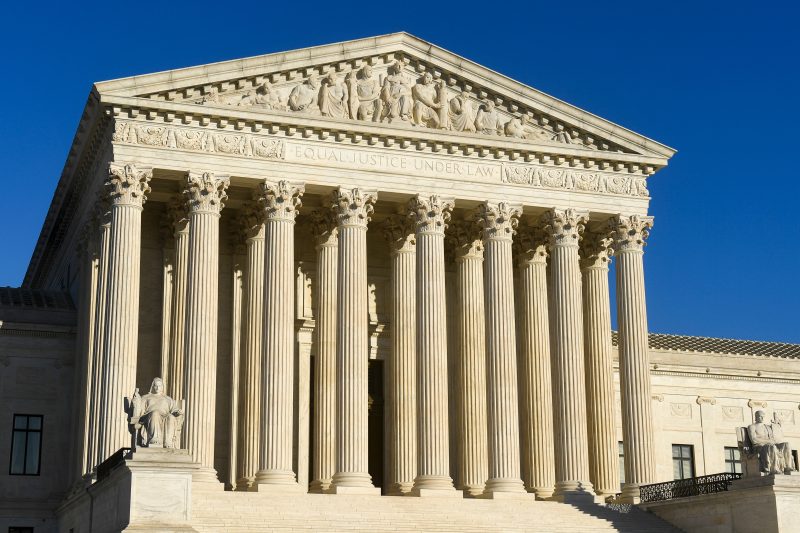A divided Supreme Court refused to require some states to enforce new rules on how schools should handle complaints of sexual harassment and discrimination, leaving in place a ban on the provisions while lower-court battles continue.
The Department of Education had asked the court to lift the preliminary injunctions on enforcing the rules, arguing that the decisions by federal courts in Louisiana and Kentucky to block the entirety of Title IX regulations in a number of states were overly broad. States requested the injunctions based on objections to provisions within the regulations that deal with discrimination based on gender identity.
Friday’s 5-4 ruling leaves in place a messy status quo, where the regulations are in effect in about half of U.S. states. Justice Neil M. Gorsuch joined the court’s three liberals in dissenting from the majority opinion.
The regulations, issued in April, represent the Biden administration’s interpretation of Title IX, a half-century-old law that bars sex-based discrimination in schools and applies to K-12 schools, colleges and universities that accept federal funding.
They took effect Aug. 1 in the states not covered by the injunctions. For the first time, the regulations say that discrimination based on sex includes conduct related to a person’s gender identity. The rules could require, for instance, schools to allow transgender students to use bathrooms and locker rooms that align with their gender identity and to use trans students’ pronouns.
But the bulk of the regulation deals with other matters, notably how schools must handle complaints of sexual assault and harassment on campus.
A Department of Education spokeswoman decried the court’s decision, as did Shiwali Patel, senior director of Safe and Inclusive Schools at the National Women’s Law Center. “We are disappointed in the Supreme Court’s decision that creates significant harm to students across the country who are in need of the critical protections the new Title IX rule offers and clarifies,” Patel said in a statement.
In issuing the rules, Biden administration officials pointed to a 2020 Supreme Court ruling in Bostock v. Clayton County, which found that sex discrimination in employment includes discrimination based on gender identity and sexual orientation. The same logic applies to Title IX, they said.
Gender identity has become a major political flash point in recent years, particularly in education. At least a dozen states across the country have rules limiting transgender access to the bathrooms and facilities that match their gender identity, according to tracking by the Movement Advancement Project. Some school boards bar students from changing their names or pronouns without parental permission or prohibit teachers from using pronouns that don’t match the sex assigned to the student at birth.
Twenty-six states, working in groups, filed seven separate lawsuits seeking to block the new Title IX regulations from going into effect. Six of the suits were successful at the district court level and the seventh group won at the appellate court. As a result, the regulation took effect as scheduled in 24 states, the District of Columbia and Puerto Rico, but is on hold in the 26 states that are party to the challenges.
The challengers argued that the Biden administration exceeded its authority in crafting the rules and said the regulations violate state laws that limit the rights of transgender students.
The requests denied by the Supreme Court only dealt with two of the lawsuits and therefore only affect the 10 states that are party to those suits. Jonathan Scruggs of Alliance Defending Freedom, a legal group involved in one of the lawsuits, applauded the court’s decision.
“The Biden-Harris administration’s radical redefinition of sex turns back the clock on equal opportunity for women, undermines fairness, and threatens student safety and privacy,” Scruggs said in a statement. “This administration is ignoring biological reality, science, and common sense.”
Louisiana, Mississippi, Montana and Idaho challenged the Title IX regulations in May. In June, a federal district court judge in Louisiana granted the states a preliminary injunction blocking the implementation of the entire set of regulations, not just those related to gender identity.
Six states — Tennessee, Ohio, Indiana, Kentucky, Virginia and West Virginia — won a similar stay from a federal district court judge in Kentucky.
Courts of appeal in both circuits denied requests by the Biden administration to temporarily enforce the Title IX regulations while legal challenges continue.
In her filings with the Supreme Court seeking to lift the injunctions, U.S. Solicitor General Elizabeth B. Prelogar said Title IX was an omnibus rule and most of its provisions did not deal with transgender issues. She also wrote that the rules were intended to stand alone, so there was no reason to block Title IX in its entirety.
“Respondents have not challenged the vast majority of those changes,” Prelogar wrote. “Instead, they object to three discrete provisions.”
Twelve other states also won injunctions against the Title IX rules in four other separate cases, but they are not part of the current litigation before the Supreme Court.
In a separate action, the Supreme Court has agreed to review during the coming term a Tennessee law that bans gender-affirming care for people younger than 18. It will be the first time the court has explored the issue. More than 20 states have passed similar bans since 2021.

